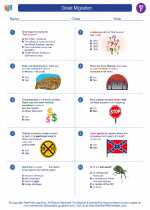Pharaohs in Ancient Egypt
In ancient Egypt, the title "pharaoh" referred to the ruler of the country. The pharaoh was not only the political leader but also held significant religious and cultural importance in the society. The word "pharaoh" means "great house" or "palace" in ancient Egyptian, indicating the royal nature of the position.
Role of the Pharaoh
The pharaoh was believed to be a divine ruler, considered the intermediary between the gods and the people. As such, the pharaoh was responsible for maintaining Ma'at, the divine order and balance of the universe. The pharaoh was also in charge of leading military campaigns, overseeing construction projects, and making important decisions for the kingdom.
Study Guide
- What does the title "pharaoh" mean in ancient Egyptian?
- What was the role of the pharaoh in ancient Egypt?
- How was the pharaoh perceived by the ancient Egyptians?
- What were some of the responsibilities of the pharaoh?
- How did the pharaoh maintain Ma'at?
Understanding the role and significance of the pharaoh in ancient Egypt is crucial for comprehending the political and religious aspects of this ancient civilization. Studying the pharaohs can provide insights into the power structures, religious beliefs, and cultural practices of ancient Egypt.
[Pharaoh] Related Worksheets and Study Guides:
.◂Social Studies Worksheets and Study Guides Sixth Grade. Great Migration

 Worksheet/Answer key
Worksheet/Answer key
 Worksheet/Answer key
Worksheet/Answer key
 Worksheet/Answer key
Worksheet/Answer key
